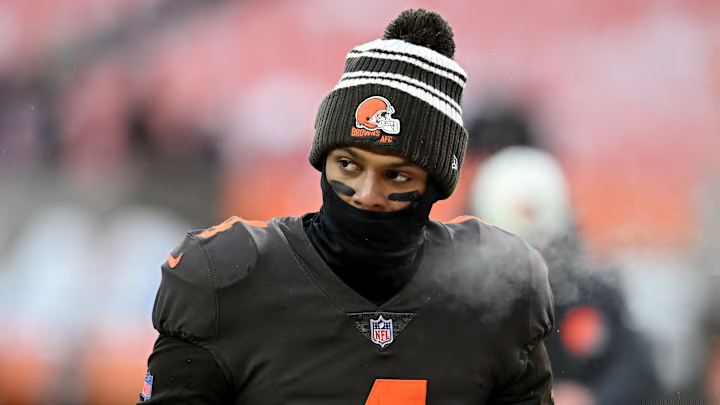In March of 2022, the Cleveland Browns traded three first-round picks, a third-round pick and a fourth-round pick to acquire Deshaun Watson from the Houston Texans. The team then proceeded to give Watson $230 million guaranteed.
When the news was announced, many fans and media outlets alike raised the concern about how the quarterback would fair in Cleveland. Specifically, how he would fair in the cold, blustery Cleveland weather in a stadium sitting on Lake Erie.
For all of Watson's career in the NFL before 2022, he played every home game in a dome. Not only do the Texans play in a dome, but their divisional rivals all play in weather-friendly environments. The Indianapolis Colts also play in a dome, and the Jacksonville Jaguars play in Florida, so cold weather is not a concern there. The only AFC South team with a chance to play in a cold-weather game is the Tennessee Titans.
Before Watson joined the Browns, the coldest game he'd ever played in was 28°. Last season on Christmas Eve against the New Orleans Saints, the Browns took the field in 4° weather. According to Nate Ulrich from the Akron Beacon Journal, it was the second-coldest game recorded in Browns history. So despite playing most of his career in Texas, Watson has already been tested in some of the coldest weather possible.
Watson has played 10 career games in weather below 50°. He played in six of those games over his four seasons with the Texans, and he's already played in four of those games with the Browns. That's one thing Browns fans need to remember; not only did Watson come into the 2022 season cold, but he also came back during the coldest weather of the season too.
So how has the quarterback performed in these games?
One stat to focus on for these games is Watson's adjusted completion percentage. Over his career, Watson's completion percentage is 67.0% (which is a really nice number anyway), but his adjusted completion percentage over his career is 75.4%. So what exactly is adjusted completion percentage?
According to Pro Football Focus (PFF), adjusted completion percentage is a much more accurate evaluation of a quarterback's performance in a game. While completion percentage simply records whether a pass attempt was completed or not, adjusted completion percentage accounts for why an attempt was completed or not.
Remember, throwing a pass is only part of the equation for a completion. What happens after the ball leaves the quarterback's hand is largely out of his control, especially if he's delivering a well-thrown, catchable pass. Adjusted completion percentage takes into factor things like throwaways, dropped passes, spiked balls, and balls batted or tipped at the line.
It also factors in passes thrown as the quarterback is being hit. In essence, adjusted completion percentage records the percentage of actual passes that should have been completed.
Let's look at Watson's career in Houston first. In six games below 50°, Watson led the Texans to a 1-5 record while throwing 1,521 yards, 8 TDs, and 3 INTs. On average, he completed 67% of his throws for 254 yards, 1 TD, and 1 INT. He also averaged 7 rushes for 34 yards. While Watson's 67% completion is a nice number, his adjusted completion percentage was even better at 75.6% in games played under 50°.
His best performance came in the coldest conditions he faced prior to playing in Cleveland. On January 12, 2020, the Texans played in the Divisional Round of the playoffs in Kansas City. That was the 28° game mentioned previously. In that game against the Chiefs, Watson completed 31/52 passes for 388 yards and 2 TDs. He added 6 carries for 37 yards and another score on the ground.
While his 59.6% completion was the lowest of his sub-50° games, his adjusted completion percentage in that game was 73.5%, right on par with his usual performance. The Texans receivers also committed five dropped passes in that playoff game, adding to Watson's low completion percentage.
In his four sub-50° games with the Browns, Watson led the team to a 1-3 record while throwing 802 yards, 4 TDs and 4 INTs. On average, he completed just 58.6% of his throws for 201 yards, 1 TD and 1 INT. He also averaged 5 rushes for 31 yards (almost the same as his rushing numbers in Houston).
But what was Watson's adjusted completion percentage in those four games last season? 76.4% — even higher than his numbers while in Houston, which included three Pro Bowl seasons.
And how did Watson perform in that 4° game on Christmas Eve?
Not only was the temperature in the single digits, but the Browns also faced 25 mph winds with 37 mph gusts. Despite the horrid conditions, Watson completed 15/31 passes for 135 yards, 0 TDs, and 1 INT. Yet his adjusted completion percentage in that game was 73.1%, only slightly below his career average.
Here is a quick breakdown of Watson's adjusted completion percentage over his career:
- Career: 75.4%
- With Houston: 74.1%
- With Cleveland: 73.0%
- Sub-50° games with Houston: 75.6%
- Sub-50° games with Cleveland: 76.4%
- Career in games sub-40°: 77.0%
- Career in games sub-30°: 73.3%
- Career in games sub-10°: 73.1%
Whether it's warm and sunny or cold and nasty, Watson is consistent with his passing performance. The win/loss record and box scores may all look different, but that's because football is not a quarterback-only game.
But when looking at the stat that best evaluates Watson's individual performance, the numbers show a consistent player. Browns fans can feel confident that Watson will continue to perform well in the cold-weather games he'll face in Cleveland and around the rest of the AFC North.
